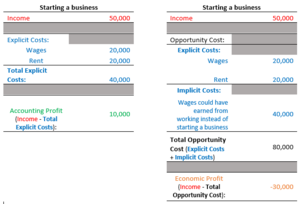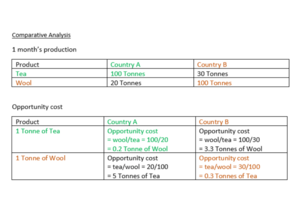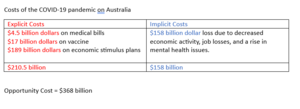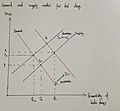Opportunity cost facts for kids
Imagine you have to make a choice, but you can only pick one option. The opportunity cost is what you give up when you choose one thing over another. It's the value of the best thing you didn't choose.
For example, if you have money to buy either a new video game or a book, and you choose the video game, the opportunity cost is the book you didn't get to read. It's not just about money. It can also be about time, fun, or any other benefit you value. Understanding opportunity cost helps us make smart decisions with the limited things we have, like time or money.
Contents
Understanding Different Types of Opportunity Costs
What are Explicit Costs?
Explicit costs are the direct and clear costs you pay for something. These are usually easy to see and involve money changing hands. Think of them as "out-of-pocket" expenses.
For example:
- If you buy a new pair of shoes for $50, that $50 is an explicit cost.
- A company paying its employees their salaries is an explicit cost.
- The money a business spends on rent for its office is also an explicit cost.
These costs are often written down in financial records, so they are easy to track.
What are Implicit Costs?
Implicit costs are the hidden costs of a choice. They don't involve money directly changing hands, but they represent something valuable you gave up. These costs are often harder to see.
For example:
- If you spend an hour playing video games, the implicit cost might be the hour you could have spent studying for a test.
- A small business owner might work many hours without taking a salary. The implicit cost is the money they could have earned working somewhere else.
- If a company uses its own building for its office, the implicit cost is the rent money it could have earned by leasing the building to someone else.
These costs are important for making good decisions, even if they aren't recorded in a company's financial books.
What Isn't an Opportunity Cost?
Sunk Costs
Sunk costs are money or resources you've already spent and cannot get back. These costs should not affect your future decisions.
Imagine you bought a ticket to a movie for $10. Halfway through, you realize the movie is terrible. The $10 you spent is a sunk cost. It's gone. Deciding whether to stay or leave should only depend on whether you want to spend more of your time watching a bad movie, not on the money you already spent.
Marginal Cost
Marginal cost is the extra cost of making one more item. For example, if a bakery makes 100 cookies, and it costs a little more to make the 101st cookie, that extra cost is the marginal cost. Businesses look at marginal costs to decide how many products to make.
Why Opportunity Cost Matters
Making Smart Business Choices
Businesses often look at two kinds of profit: accounting profit and economic profit.
Accounting profit only looks at the money a business takes in versus the direct money it spends. It's like looking at your allowance and subtracting what you spent on snacks.
Economic profit is different. It also considers the opportunity costs. This means it looks at the value of the best alternative a business gave up. This helps businesses make better long-term decisions.
For example, a person might start a business that makes $10,000 in accounting profit. But if that person could have earned $40,000 working for another company, the economic profit would be negative ($10,000 - $40,000 = -$30,000). This shows that starting the business might not have been the best choice, even if it made some money.
When economic profit is zero, it means the business is covering all its costs, including the value of what it gave up. This is called normal profit. It means the business is doing as well as its next best alternative.
Why Countries Trade: Comparative vs. Absolute Advantage
Opportunity cost helps us understand why countries or even people choose to specialize and trade.
Comparative advantage means that a country or person can produce something at a lower opportunity cost than another. It's about what you give up to make something.
Let's say Country A can make tea by giving up less wool than Country B. Then Country A has a comparative advantage in making tea. Country A should focus on making tea.
Absolute advantage means a country or person can produce more of something using the same amount of resources. It's about being more efficient.
For example, if Country A can grow more apples with the same amount of land and workers than Country B, then Country A has an absolute advantage in growing apples.
Even if a country has an absolute advantage in everything, it's still better to focus on what it has a comparative advantage in. By doing this, countries can produce more overall and trade with each other, making everyone better off.
Government Choices and Opportunity Costs
Governments also face opportunity costs when they make decisions about how to spend public money. Every choice means giving up something else.
For example, if a government decides to spend a large amount of money on building new roads, the opportunity cost could be the new schools or hospitals that won't be built with that same money.
During the COVID-19 pandemic, governments spent huge amounts on medical supplies, vaccines, and helping people financially. These were explicit costs. The implicit costs included things like lost business activity and jobs because of lockdowns. These decisions had big trade-offs. For instance, focusing on treating COVID-19 patients meant fewer resources were available for other health issues.
Understanding opportunity cost helps governments decide how to use limited resources to benefit the most people.
Images for kids
See also
 In Spanish: Coste de oportunidad para niños
In Spanish: Coste de oportunidad para niños
- Austrian School
- Best alternative to a negotiated agreement
- Budget constraint
- Dead-end job
- Economies of scale
- Econometrics
- Fear of missing out
- Lost sales
- No such thing as a free lunch
- Parable of the broken window
- Production–possibility frontier
- Reduced cost
- Time management
- Time sink
- Trade-off
- Transaction cost






